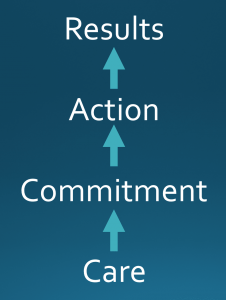
I received an excellent question from Mandy, one of the subscribers to my blog. Where is the line between an employee’s and their manager’s responsibility for that person’s development? Mandy points out that some people don’t have the desire to learn and grow. Can a manager change that and should they be held responsible?
Willingness and capability, the key ingredients
The generation of any outcome, requires a combination of willingness and capability. Willingness is the motivation or commitment to take action. Capability is the necessary skill to be able to complete the task successfully. Let’s start with willingness. My coaching philosophy involves the following hierarchy. Results are created by taking action. Action occurs from commitment. When we are committed to something we take action. Commitment comes from care, the things that are important to us.
The manager is responsible for creating a culture where employees can share what they care about. Is there a connection between the role and that person’s cares? In most cases, the manger can join the dots and create that connection. This is a key leadership skill. We will only follow someone if we believe it is in our interests to do so. If it turns out that person’s care isn’t aligned to their role, the manager has to act to find an alternative. This is a very difficult conversation because the stakes are high. Avoiding it doesn’t make things any easier. Keeping somebody around who isn’t motivated or worse still actively dislikes the role, doesn’t serve anyone well.
Capability is a bit easier to manage and is where most of our focus exists today. The manager is responsible for providing feedback to the employee. This is their assessment of the employee’s level of capability. It is usually provided in terms of assessing results against expectations. There is a partnership between employee and manager to develop the necessary skills. And the manager is responsible to provide the opportunity, support and resources to do so.
Employee responsibility
This leaves us with the responsibility of the employee. I don’t see any right or wrong answers here, it depends on the employee’s motivations. Earlier in my career I believed everyone wanted to get to the top of the organization. I now know that was a limitation of my own level of maturity, and each person in an organization will have different goals. Their responsibility is to take action to achieve the outcomes that are important to them. Whatever they may be.
Thanks Mandy for this excellent question. How would you answer her question? What is your responsibility as a manager?



Agreed Andy, it is a leader’s responsibility is to help team members connect the work at hand to what they really care about, not to create that connection and motivation for them.
Thanks Timm. As I think about this further, it also reinforces the concept of giving an employee a choice about which team to be a part of. I used to think I should assign employees to a team because I was their boss. It never occurred to me to give them a choice, and I wondered why some were not motivated.